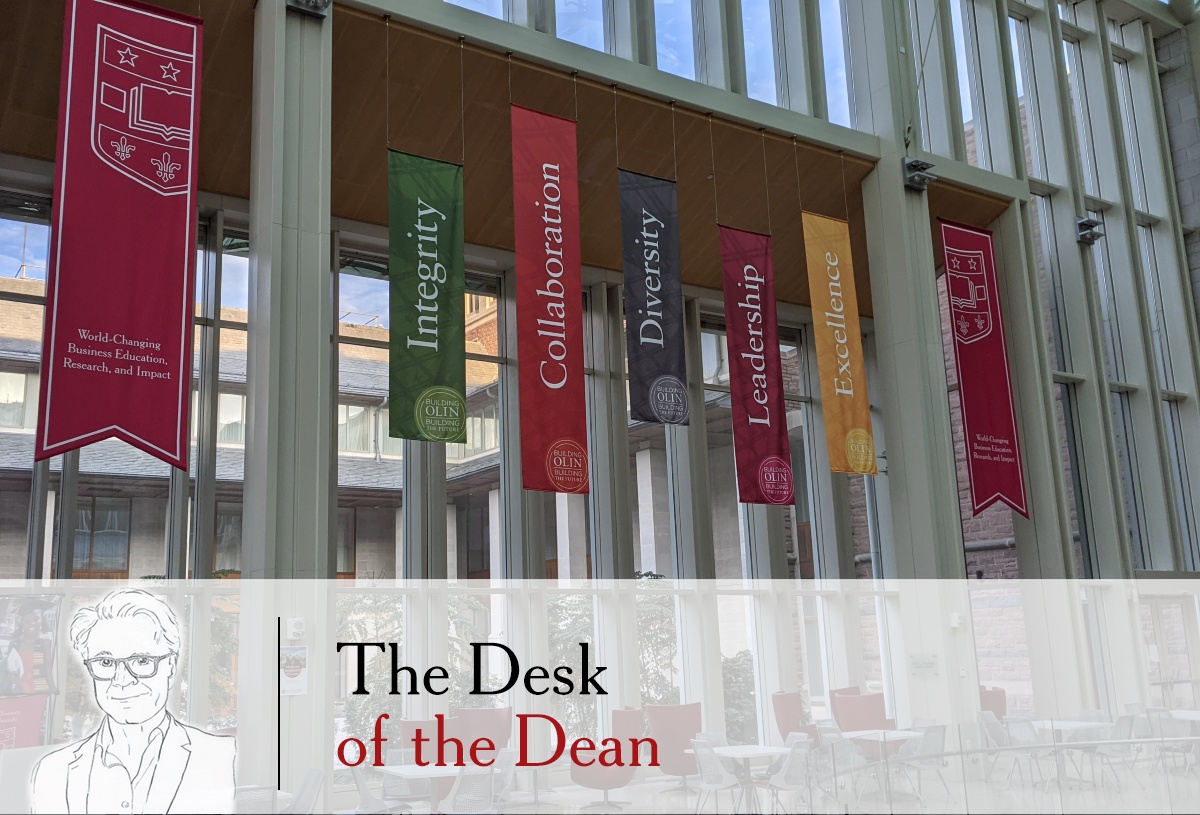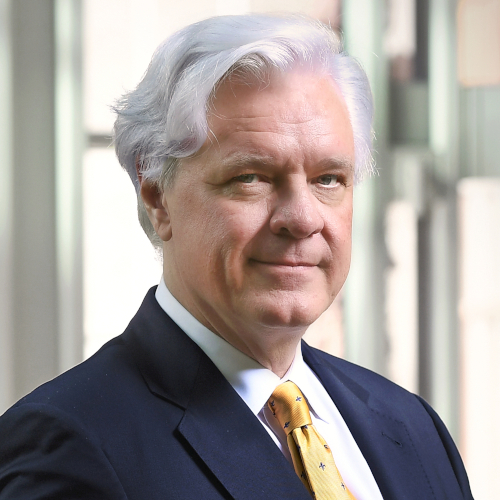We surveyed our staff and faculty about Olin’s values. Where has that led us?
- November 3, 2021
- By Mark Taylor
- 4 minute read

Leaders in the corporate world know the importance of having a guiding star for their organization—the values, the mission, the vision. Having that guiding star is one thing. Ensuring your team members know, understand and follow it is another thing entirely.
At WashU Olin, we have that guiding star. Indeed, our institutional values hang from banners in the atrium for all to see: integrity, collaboration, diversity, leadership and excellence. And in spring 2021, we sought to gauge how well members of the Olin community recalled those values—and how well their definition of each value aligned with the definition our school intends to communicate.
What emerged was a picture of the Olin community that largely understands, agrees with and practices our institutional values. At the same time, we identified areas of improvement, strategies to more fully communicate our values and opportunities to better highlight and recognize the values-based contributions of our staff and faculty.
So, let’s take a high-level walk through what we learned and our next steps.
Why conduct this survey?
Anyone who works at Olin by now should be familiar with our four pillars of excellence: sparking the entrepreneurial spirit; instilling a global business mindset; fostering experiential learning; and, primarily, empowering values-based, data-driven leadership.
Our programs, our coursework and our career services are steeped in these pillars. It’s what we want and expect for our students. And we should hold ourselves to those same standards.
As I mentioned, closing the loop is important. Having values and communicating them are two separate issues. So, the survey we conducted in April-May 2021 was built to measure whether our colleagues share the same definition of Olin’s values. Beyond that, we hoped to learn whether individuals live out these values in their daily work and see others doing the same.
We also wanted to understand the Olin community’s ideas about how we could deepen the commitment to the values, while also recognizing those who do it well. I’m happy to say the survey delivered what we set out to accomplish.
Strengths and opportunities
I’m gratified to report that a large majority of Olin’s team is very aware or extremely aware of our school’s values. In fact, 85% responded positively to the values and more than half say the way we articulate these values gives them a more favorable impression of the school. And, for the most part, the survey respondents share the same definition of the values (By the way, check here for Olin’s definition of each value.). A large majority said they can see the way all five values apply to Olin. The strongest of those was excellence, where 91% saw it reflected at Olin. The lowest—yet still a majority—was diversity, at 63%
And certainly, as we know well, that is an area of opportunity for Olin, which is why I’ve devoted resources to recruiting leaders in that area and charting a strategic plan for inclusion, diversity, equity and access. That’s why we’ve now appointed a senior associate dean, Ashley Macrander, who has joined my senior leadership team to spearhead these important strategic initiatives as developed by the task force.
Meanwhile, we will appoint an associate dean for IDEA who will work with Jacqueline Carter, the program manager for IDEA. And we’ve hired Gisele Marcus, a new faculty member dedicated to developing curriculum around diversity and equity.
Gisele will also work with the dean’s office to design and build the new diversity research lab, a new hub for scholarly research in the realm of diversity in business—including the workplace, financial markets and more. The lab will be designed to gather scholars and assist in research funding where needed.
Much remains to be done, but I am confident we are heading in the right direction on this front, and I remain firmly committed to furthering our progress.
Where the survey leads us
In addition to our work toward becoming a more diverse and inclusive workplace—work begun well before this survey—we are also embarking on several initiatives to better communicate our values, promote alignment, foster a values-based workplace and recognize individuals who are leaders in this area.
Watch for experiences such as webinars and other materials defining what it means to be a values-based and data-driven leader. We’ll also work with department leads and area chairs to develop resources that will link the work of each team—and individuals within those teams—more directly with Olin’s values. Survey respondents recommended more guidance in this area, even though a large majority could cite examples of colleagues incorporating values in their day-to-day work.
Finally, Olin’s HR team is working on designing a recognition program to highlight and celebrate individual who embrace our values. We’ll incorporate a values-based component in our performance appraisals and, in partnership with marketing and communications, we’ll build a mechanism to spotlight individuals and their values-based success stories.
From the outset of this process, I was determined that the survey would not gather dust on a shelf. Whatever it said, we needed to act on it. Hearing feedback from our community is what drives us to walk the walk as the values-based, data-driven institution we are.
Media inquiries
For assistance with media inquiries and to find faculty experts, please contact Washington University Marketing & Communications.
Monday–Friday, 8:30 to 5 p.m.
Sara Savat
Senior News Director, Business and Social Sciences
